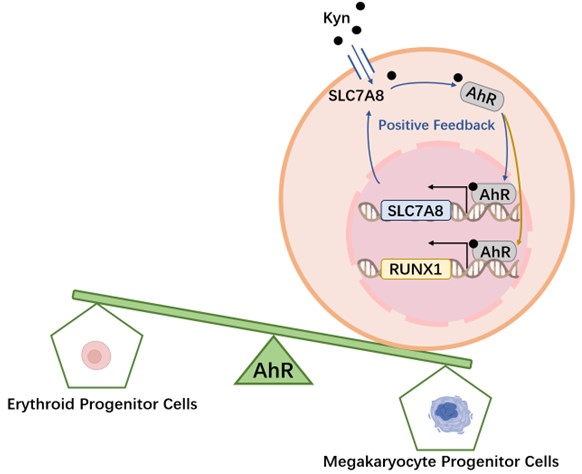Prof. Bo Huang, Xiaohui Zhang and Yi Zhang reveal the mystery of anemia and thrombocytosis in cancer patients
Source:Li Zhou
2023-11-17
On November 3rd 2023, Professor Bo Huang’s Lab from Institute of Basic Medical Sciences, Chinese Academy of Medical Sciences, collaborating with Professor Xiaohui Zhang’s team from Peking University People's Hospital and Professor Yi Zhang’s team from First Affiliated Hospital of Zhengzhou University, published a research article titled "Tumor cell-released kynurenine biases MEP differentiation into megakaryocytes in cancer patients by activating AhR-RUNX1 " in Nature Immunology. This study reveals the mechanism of anemia and thrombocytosis in cancer patients. Tumor cell-released-kynurenine (Kyn), metabolic product of tryptophan, is taken up by megakaryocyte-erythroid progenitors (MEP) in bone marrow, then activates aryl hydrocarbon receptor (AhR) and induces MEP differentiation to megakaryocyte, ultimately results in decreasing red blood cells (RBCs) and increasing platelets (PLTs).
Anemia and thrombocytosis are the common consequence of abnormal hematopoiesis in advanced cancer patients, which lead to a poor prognosis in various types of cancers, and even mediate the death of patients. The mechanism of this clinical phenomenon has remained elusive. PLTs and RBCs are derived from the common progenitor cell MEP. AhR plays a crucial role in various hematopoietic stem cells and progenitor cells.
The research teams established tumor-bearing mouse model, in which observed abnormal MEP differentiation and AhR activating. In vitro colony-forming unit (CFU) experiments confirmed that MEP of tumor-bearing mouse differentiated towards megakaryocytes. However, RBCs and PLTs development abnormalities were not observed in AhR knockout tumor-bearing mice. Previous studies of Bo Huang’s team have shown that indoleamine 2,3-dioxygenase 1 (IDO1) upregulated expression in both tumor-bearing mice and cancer patients, which catalyzes tryptophan into AhR ligand Kyn. After Kyn released into circulation, it can activate AhR in MEPs. MEP differentiation is regulated by transcription factors. The research teams discovered that RUNX1, which regulate megakaryocyte differentiation, was increased in MEP of tumor-bearing mice; Moreover, there was positive feedback between AhR and SLC7A8, a transporter of AhR ligand Kyn. By utilizing a humanized mouse model, the research teams demonstrated that Kyn-AhR-RUNX1 regulated human MEP differentiation in vivo. Furthermore, the researchers validated that dysregulated MEP differentiation mediated by Kyn-AhR-RUNX1 in leukemia patients and no BM infiltration lymphoma patients.
AhR, as a key molecule in tumor immunity, has several inhibitors undergoing clinical trials. This study elucidates mechanisms that AhR contributes to tumor-related anemia and thrombocytosis. These findings also lay the foundation for developing drugs that preventing thrombocytosis and anemia.

This work was supported by National Natural Science Foundation of China (82388201), Chinese Academy of Medical Sciences (CAMS) Innovation Fund for Medical Sciences (CIFMS) (2021-I2M-1-021), National Key Research and Development Program of China (no. 2021YFC2500304; 2022YFA1206000).
Article links: https://www.nature.com/articles/s41590-023-01662-3
Anemia and thrombocytosis are the common consequence of abnormal hematopoiesis in advanced cancer patients, which lead to a poor prognosis in various types of cancers, and even mediate the death of patients. The mechanism of this clinical phenomenon has remained elusive. PLTs and RBCs are derived from the common progenitor cell MEP. AhR plays a crucial role in various hematopoietic stem cells and progenitor cells.
The research teams established tumor-bearing mouse model, in which observed abnormal MEP differentiation and AhR activating. In vitro colony-forming unit (CFU) experiments confirmed that MEP of tumor-bearing mouse differentiated towards megakaryocytes. However, RBCs and PLTs development abnormalities were not observed in AhR knockout tumor-bearing mice. Previous studies of Bo Huang’s team have shown that indoleamine 2,3-dioxygenase 1 (IDO1) upregulated expression in both tumor-bearing mice and cancer patients, which catalyzes tryptophan into AhR ligand Kyn. After Kyn released into circulation, it can activate AhR in MEPs. MEP differentiation is regulated by transcription factors. The research teams discovered that RUNX1, which regulate megakaryocyte differentiation, was increased in MEP of tumor-bearing mice; Moreover, there was positive feedback between AhR and SLC7A8, a transporter of AhR ligand Kyn. By utilizing a humanized mouse model, the research teams demonstrated that Kyn-AhR-RUNX1 regulated human MEP differentiation in vivo. Furthermore, the researchers validated that dysregulated MEP differentiation mediated by Kyn-AhR-RUNX1 in leukemia patients and no BM infiltration lymphoma patients.
AhR, as a key molecule in tumor immunity, has several inhibitors undergoing clinical trials. This study elucidates mechanisms that AhR contributes to tumor-related anemia and thrombocytosis. These findings also lay the foundation for developing drugs that preventing thrombocytosis and anemia.

This work was supported by National Natural Science Foundation of China (82388201), Chinese Academy of Medical Sciences (CAMS) Innovation Fund for Medical Sciences (CIFMS) (2021-I2M-1-021), National Key Research and Development Program of China (no. 2021YFC2500304; 2022YFA1206000).
Article links: https://www.nature.com/articles/s41590-023-01662-3


